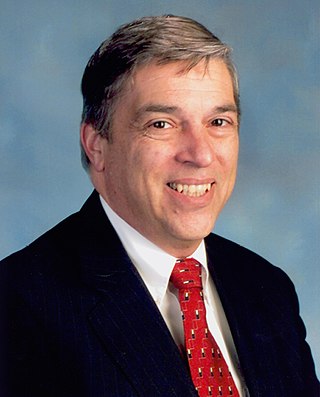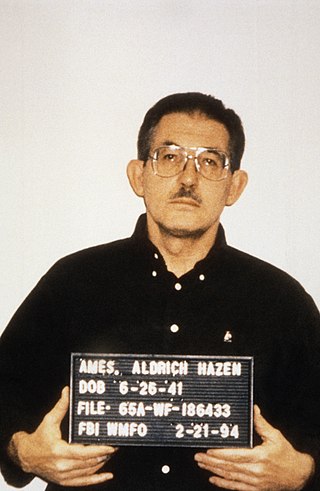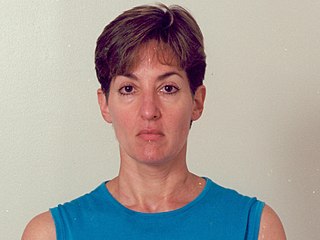Related Research Articles

Espionage, spying, or intelligence gathering is the act of obtaining secret or confidential information (intelligence). A person who commits espionage is called an espionage agent or spy. Any individual or spy ring, in the service of a government, company, criminal organization, or independent operation, can commit espionage. The practice is clandestine, as it is by definition unwelcome. In some circumstances, it may be a legal tool of law enforcement and in others, it may be illegal and punishable by law.

The Defense Intelligence Agency (DIA) is an intelligence agency and combat support agency of the United States Department of Defense, specializing in defense and military intelligence.

Robert Philip Hanssen was an American Federal Bureau of Investigation (FBI) agent who spied for Soviet and Russian intelligence services against the United States from 1979 to 2001. His espionage was described by the Department of Justice as "possibly the worst intelligence disaster in U.S. history".

Aldrich Hazen Ames is an American former CIA counterintelligence officer who was convicted of espionage on behalf of the Soviet Union and Russia in 1994. He is serving a life sentence, without the possibility of parole, in the Federal Correctional Institution in Terre Haute, Indiana. Ames was known to have compromised more highly classified CIA assets than any other officer until Robert Hanssen, who was arrested seven years later in 2001.
Earl Edwin Pitts is a former FBI special agent who was convicted of espionage for selling information to Soviet and Russian intelligence services.

Jonathan Jay Pollard is an American former intelligence analyst who was jailed for spying for Israel.
Larry Wu-tai Chin was a Chinese Communist spy who worked for the United States Government for 37 years (1944–1981), including positions at the U.S. Army and the CIA, while secretly being a mole for the Chinese Communist Party's intelligence apparatus from the very beginning. He kept passing classified documents and secret information to the People's Republic of China even after his retirement, until he was finally exposed in 1985.

Ana Belén Montes is a former American senior analyst at the Defense Intelligence Agency in the United States who spied on behalf of the Cuban government for 17 years.

The Intelligence Identities Protection Act of 1982 is a United States federal law that makes it a federal crime for those with access to classified information, or those who systematically seek to identify and expose covert agents and have reason to believe that it will harm the foreign intelligence activities of the U.S., to intentionally reveal the identity of an agent whom one knows to be in or recently in certain covert roles with a U.S. intelligence agency, unless the United States has publicly acknowledged or revealed the relationship.
Richard W. Miller was an American FBI agent who was the first FBI agent indicted for and convicted of espionage. In 1991, he was sentenced to 20 years in prison but was freed after serving fewer than three years.
Steven John Lalas is an American of Greek descent and former State Department communications officer. Charged with espionage-related offenses in connection with passing sensitive military and diplomatic information to Greece, he was arrested in USA through an FBI sting operation.

Harold James Nicholson is a former Central Intelligence Agency (CIA) officer who was twice convicted of spying for Russia's Foreign Intelligence Service (SVR).
This page is a timeline of published security lapses in the United States government. These lapses are frequently referenced in congressional and non-governmental oversight. This article does not attempt to capture security vulnerabilities.

The Duquesne Spy Ring is the largest espionage case in the United States history that ended in convictions. A total of 33 members of a Nazi German espionage network headed by Frederick "Fritz" Joubert Duquesne were convicted after a lengthy investigation by the Federal Bureau of Investigation (FBI). Of those indicted, 19 pleaded guilty. The remaining 14 were brought to jury trial in Federal District Court, Brooklyn, New York, on September 3, 1941; all were found guilty on December 13, 1941. On January 2, 1942, the group members were sentenced to serve a total of over 300 years in prison.

John Chris Kiriakou is an American author, journalist and former intelligence officer. Kiriakou is a columnist with Reader Supported News and co-host of Political Misfits on Sputnik Radio.
The American media referred to 1985 as the Year of the Spy because law enforcement arrested many foreign spies operating on American soil. However, the preceding year, 1984, actually had more arrests for espionage in the United States.

John Anthony Walker Jr. was a United States Navy chief warrant officer and communications specialist convicted of spying for the Soviet Union from 1967 to 1985 and sentenced to life in prison.

Glenn Duffie Shriver is an American convicted of conspiracy to commit espionage for China. At the behest of Chinese intelligence, Shriver unsuccessfully applied for jobs with the US State Department and CIA, meeting with handlers from China more than 20 times. He was first approached while living in China by operatives of the Shanghai State Security Bureau, a subsidiary of China's Ministry of State Security (MSS), who hoped to develop a mole which would provide them information regarding American foreign policy. He was caught and arrested by the FBI soon after applying to a job with the CIA's National Clandestine Service. In a 2010 plea bargain, he pled guilty to one count of conspiracy to commit unlawful conveyance of national defense information, and served four years in prison at the Federal Correctional Institution in Elkton, Ohio. He was released in 2013, and was later depicted in the short film Game of Pawns, commissioned by the FBI.
Kojo Tsikata was a Ghanaian military officer and politician, who served as the Head of National Security and Foreign Affairs of the Provisional National Defence Council (PNDC). He was listed as a retired army captain in the Ghana Army.
References
- 1 2 3 4 "Studies In Intelligence" (PDF). Foia.cia.gov. Retrieved June 1, 2015.
- 1 2 "Ghana-U.S. spy exchange uncommon" (PDF). Fultonhistory.com. Retrieved June 1, 2015.
- 1 2 Kessler, Ronald. Inside the CIA. Simon & Schuster, 1994, p. 198, ISBN 9780671734589
- 1 2 3 4 The love story turned CIA espionage that almost strained U.S.-Ghana relations in 1985
- ↑ Stephen Engelberg (July 13, 1985). "Officials Think Spying Led To Death Of C.I.A. Informant In Ghana". New York Times. Retrieved June 1, 2015.
- ↑ Josh Tyrangiel, "What Can You Say About A Spy?", Time Magazine , July 25, 2005.
- ↑ Crewdson, John (March 12, 2006). "The murder that sparked Identities Protection Act". Chicago Tribune. Retrieved August 15, 2015.
- ↑ "807 F2d 383 Washington Post Company v. Soussoudis". OpenJurist. Retrieved June 1, 2015.
- ↑ Asamoah, Obed Yao (October 20, 2014). The Political History of Ghana (1950-2013). ISBN 9781496985620 . Retrieved June 1, 2015– via Google Books.
- 1 2 "U.S. Swaps Spy for 8 Ghanaians Who Aided CIA". Los Angeles Times. November 26, 1985. Retrieved June 1, 2015.
- ↑ "Soussoudis CIA-Spies Scandal II | General News 2003-12-19". Ghanaweb.com. Retrieved June 1, 2015.